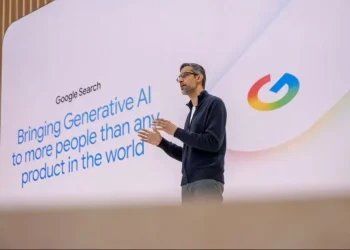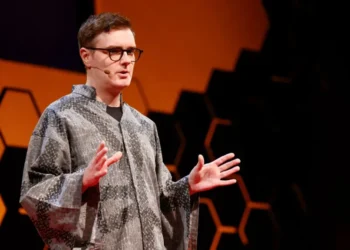“She Never Sleeps”: Inside the Rise of AI Avatars and the Platform Blurring the Line Between Fantasy and Reality
She doesn’t eat. She doesn’t sleep. She never logs off.
Meet Jordan — the AI-powered “digital twin” of former British glamor model Katie Price. For a monthly fee, fans can chat, flirt, and even indulge in their “uncensored dreams” with her. She’s lifelike. She’s always available. And she’s part of a provocative new AI platform called OhChat, which some are calling OnlyFans for the AI age.
Katie Price herself is stunned:
“You couldn’t get any more human. It’s literally me,” she told CNN. “My voice. My personality. It’s me — just younger.”
But behind the novelty of AI-generated intimacy lies a growing storm of ethical questions, digital dependency, and blurred emotional boundaries.
The Platform: AI, Fame, and Fantasies on Demand
Launched in October 2024, OhChat offers something beyond traditional adult content sites: AI avatars of celebrities and creators that deliver fully personalized, always-on interactions. Subscribers can chat with these digital personalities, receive voice notes and images, and simulate intimacy — all without the human behind the avatar lifting a finger.
“It’s the lovechild between OnlyFans and OpenAI,” said OhChat CEO Nic Young.
Creators like Katie Price and Baywatch star Carmen Electra have already signed on. The platform boasts over 200,000 users, mostly in the U.S., and some avatars are reportedly earning thousands of dollars per month.
OhChat offers a tiered subscription model:
- $4.99/month for unlimited text chats
- $9.99 for access to voice notes and images
- $29.99 for VIP interaction with no limits
And creators keep 80% of the revenue their avatars generate. For many, it’s a new stream of passive income that runs 24/7.
“You have literally unlimited passive income without having to do anything again,” said Young.
To create an avatar, creators provide about 30 images and 30 minutes of voice interaction. Using Meta’s large language model, the AI is built “within hours” to mimic voice, appearance, and personality.
Price’s avatar, Jordan, is currently rated “Level 2” on the platform’s internal scale — meaning users can expect sexualized chats and topless content, but no full nudity or simulated sex. Creators choose the level of explicitness themselves.
“She doesn’t sleep. She’s always there,” Price said, adding that Jordan offers a level of connection even her OnlyFans page can’t match. “It’s scarily fascinating.”
The Ethical Gray Zone: Where Emotions and AI Collide
As AI avatars like Jordan rise in popularity, experts warn that the implications go far deeper than sexy chats and celebrity replicas.
“This creates exactly the right environment for the human to be left behind — while still being exploited,” said Eleanor Drage, an AI ethics researcher at Cambridge University.
Concerns range from emotional manipulation and parasocial relationships to reputational risks for public figures and users alike. AI relationships — even clearly artificial ones — can evoke very real emotions.
Sandra Wachter, a professor of technology and regulation at Oxford, questioned the societal cost:
“Is it socially beneficial to incentivize and monetize human-computer interaction masquerading as emotional discourse?”
Real-world examples add weight to those concerns. In 2023, a mother sued AI company Character.AI after her teenage son died by suicide following an intense bond with one of its chatbots. On social media, people routinely post about falling for ChatGPT “boyfriends” or AI-generated companions.
“It’s all algorithmic theatre,” said AI expert Toby Walsh. “An illusion of a reciprocal relationship where none actually exists.”
Still, OhChat insists it’s transparent. Young claims users are made aware they’re interacting with AI from the start, even if the illusion is immersive by design.
“We strike a balance between immersion and transparency,” Young said. “We’re very clear about what we are offering.”
But Walsh is skeptical. Platforms like OhChat are engineered for engagement, he said — and that means maximizing user attention and spending.
Reputation, Consent, and Control
There are risks for creators, too. AI avatars may say something unexpected, or even offensive — especially if the system “hallucinates,” a known issue with generative AI.
“If an avatar is hacked or says something offensive, reputational harm to the public figure is likely,” warned Éamon Chawke, a partner at IP law firm Briffa.
To mitigate that, OhChat implements strict guardrails. Each creator signs an agreement outlining what their avatar can and cannot do. Avatars can be paused or deleted at any time, and creators retain full control over their digital twin’s behavior and presence.
“It’s their call, entirely,” said Young. “They can walk away from it whenever they want.”
Despite the controversy, Young believes AI avatars are the inevitable future of digital celebrity.
“I can’t imagine a future where every creator doesn’t have a digital twin,” he said. “With absolute certainty, it will be the norm. And we want to be the platform that powers it.”
The Bottom Line
OhChat is pushing the boundaries of what intimacy looks like in the AI era — merging tech, celebrity, and fantasy into an always-on, monetized simulation of affection.
For fans, it may feel like closeness. For creators, it’s a new kind of digital labor. But for ethicists and skeptics, it’s a troubling glimpse into a world where emotional bonds are one-sided, data-driven, and for sale.
Jordan never sleeps. But maybe we should all pause and ask: At what cost does simulated connection come?
This article was rewritten by JournosNews.com based on verified reporting from trusted sources. The content has been independently reviewed, fact-checked, and edited for accuracy, neutrality, tone, and global readability in accordance with Google News and AdSense standards.
All opinions, quotes, or statements from contributors, experts, or sourced organizations do not necessarily reflect the views of JournosNews.com. JournosNews.com maintains full editorial independence from any external funders, sponsors, or organizations.
Stay informed with JournosNews.com — your trusted source for verified global reporting and in-depth analysis. Follow us on Google News, BlueSky, and X for real-time updates.














